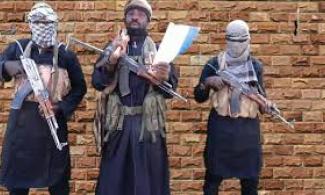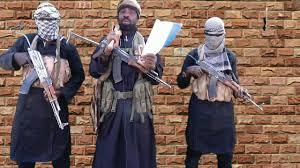
The number of Boko Haram suspects, who regained their from a detention facility in Kainji, Niger State, rose from 475 to 526 as the Federal High Court sitting in Wawa Cantonment, Kainji, concluded trials last Friday. A total of 205 suspects were convicted by the court. The facts were disclosed by Mr. Salihu Othman Isah, Special Adviser to the Attorney-General of the Federation and Minister of Justice, Mr. Abubakar Malami (SAN).
The number of Boko Haram suspects, who regained their from a detention facility in Kainji, Niger State, rose from 475 to 526 as the Federal High Court sitting in Wawa Cantonment, Kainji, concluded trials last Friday. A total of 205 suspects were convicted by the court. The facts were disclosed by Mr. Salihu Othman Isah, Special Adviser to the Attorney-General of the Federation and Minister of Justice, Mr. Abubakar Malami (SAN).
Among the reasons for freeing the 526 suspects were inadequate evidence to make charges stick, poor mental health of suspects and status as minors.
The suspects were arrested in different states and detained in Wawa Cantonment on suspicion of having links with Boko Haram.
Those discharged got their freedom on the basis of a motion exparte filed by the Federal Government prosecutors.
Modu Maina, who hails from Bama Local Government Area of Borno State, was the only suspect discharged and acquitted by the court. He was arrested in Ketu, Lagos State, where he worked as a gateman. Maina confessed that he was forcefully initiated into Boko Haram, but relocated to Lagos to avoid being arrested in Bama.

He told the court that all the confessional statements he made to the Joint Task Force (JTF) were extracted through torture. After reviewing Maina's confessional statements, the presiding judge found him not guilty.
The 205 peesons convicted by the court bagged jail sentences ranging between three and 60 years.
Most of them were convicted for admitting their membership of the terrorist group and concealing information that could assist in the arrest, prosecution or conviction of its members.
Majority of the convicts said they could not disclose information about Boko Haram because of fear of being killed.
They added that that it was a dangerous undertaking for them to travel over long distances to make reports to the JTF.
Bukar Jindi, who bagged 16 and 50 years respectively on a two count charge for professing to be a Boko Haram member and carrying out attacks leading to loss of lives and properties, was unremorseful. He vowed to go back to crime if he released.
He was arrested in 2015, aged 17, and will spend 50 years in prison with effect from the date of his arrest.
The court tried a total of 301 cases, convicted 205, freed 526 for want of evidence, poor mental health and being minors. It adjourned 73 others for continuation of hearing.
This second and concluding phase of the trials was adjudged transparent and fair by organizations such as the National Human Rights Commission, Legal Aid Council, Nigerian Bar Association and the media, which witnessed the proceedings.